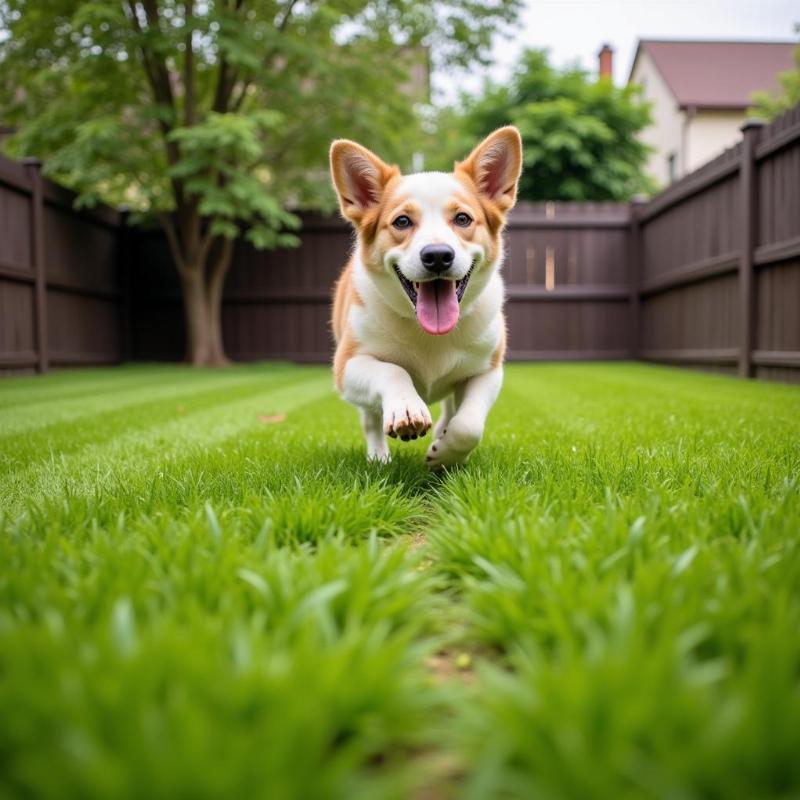Bifen granules, a common insecticide used in lawns and gardens, often raises concerns among dog owners about its safety. Understanding the potential risks and taking appropriate precautions is crucial to protecting your furry friend. This article delves into the facts about bifenthrin, the active ingredient in Bifen granules, and its effects on dogs, providing practical tips for safe usage in your backyard.
Is Bifenthrin Toxic to Dogs?
Bifenthrin is indeed toxic to dogs, though the level of toxicity varies depending on several factors, including the size and breed of the dog, the amount of exposure, and the concentration of the product. While it is classified as a pyrethroid insecticide, which is generally considered less toxic to mammals than organophosphates, exposure to bifenthrin can still lead to unpleasant symptoms and, in severe cases, serious health complications.
Understanding the Risks of Bifen Granules for Dogs
Exposure to bifenthrin can occur through ingestion, inhalation, or skin contact. Symptoms of bifenthrin poisoning in dogs can range from mild skin irritation, excessive drooling, and vomiting to more severe neurological issues such as tremors, seizures, and difficulty breathing. Even seemingly small amounts can cause discomfort, especially in smaller breeds or puppies.
Protecting Your Dog from Bifen Granules
If you’re considering using Bifen granules in your yard, prioritize your dog’s safety by following these essential guidelines:
- Keep your dog indoors: Restrict access to treated areas for at least the duration specified on the product label, often 24-72 hours, or until the granules have been watered in and the area is completely dry.
- Water the area thoroughly: After applying Bifen granules, water the area thoroughly according to the product instructions. This helps the granules settle into the soil, minimizing the risk of your dog coming into direct contact with them.
- Supervise your dog: When your dog is allowed back into the treated area, supervise them closely to prevent ingestion or digging in the treated soil.
- Store Bifen granules securely: Store any unused product in its original container, out of reach of children and pets.
 Dog playing in a safe yard after Bifen application
Dog playing in a safe yard after Bifen application
What to Do If Your Dog is Exposed to Bifen Granules
If you suspect your dog has been exposed to Bifen granules, act quickly. Contact your veterinarian or the ASPCA Animal Poison Control Center immediately. Time is of the essence in such cases. Describe the product, the estimated amount of exposure, and any symptoms your dog is exhibiting. Prompt veterinary care can significantly improve the outcome.
Recognizing Bifenthrin Poisoning Symptoms in Dogs
Be vigilant for these common signs of bifenthrin poisoning in dogs:
- Skin irritation: Redness, itching, or rash in the area of contact.
- Excessive drooling or salivation: Often one of the first signs of ingestion.
- Vomiting and/or diarrhea: Can be mild or severe depending on the level of exposure.
- Tremors and seizures: Neurological signs indicating a more serious reaction.
- Respiratory distress: Difficulty breathing, panting, or coughing.
- Lethargy and weakness: General malaise and decreased activity.
Alternative Pest Control Options for Dog Owners
Consider pet-friendly pest control alternatives such as diatomaceous earth, nematodes, or essential oil-based sprays. Consult with a professional pest control company specializing in pet-safe solutions for recommendations tailored to your specific needs and location.
Conclusion
While Bifen granules can be effective in controlling pests, it’s crucial to understand the potential risks they pose to dogs. By following the safety guidelines outlined in this article, you can minimize the risk of exposure and ensure your furry companion’s well-being. Prioritizing your dog’s safety is paramount when using any pesticide, and choosing pet-friendly alternatives whenever possible is always the best approach.
FAQ
- What is the active ingredient in Bifen granules? Bifenthrin.
- How long should I keep my dog off the lawn after applying Bifen granules? At least 24-72 hours, or as directed on the product label.
- What should I do if my dog ingests Bifen granules? Contact your veterinarian or the ASPCA Animal Poison Control Center immediately.
- Are there any safe alternatives to Bifen granules for pest control? Yes, options like diatomaceous earth and nematodes are considered safer for pets.
- What are the signs of bifenthrin poisoning in dogs? Skin irritation, excessive drooling, vomiting, tremors, seizures, and respiratory distress.
- How can I prevent my dog from being exposed to Bifen granules? Keep your dog indoors during and after application, water the treated area thoroughly, and store the product securely.
- Is Bifenthrin toxic to other pets besides dogs? Yes, it can also be toxic to cats and other animals.
Beautdogs.us is your trusted online resource for all things dog-related in the USA. We offer expert advice on dog breeds, care, and product recommendations. Whether you’re a new dog owner or a seasoned enthusiast, Beautdogs.us provides reliable information to help you navigate the joys and challenges of dog ownership. Contact us today at [email protected] or +1 501-555-7529. Visit us at Beautdogs.us for more valuable insights and resources!